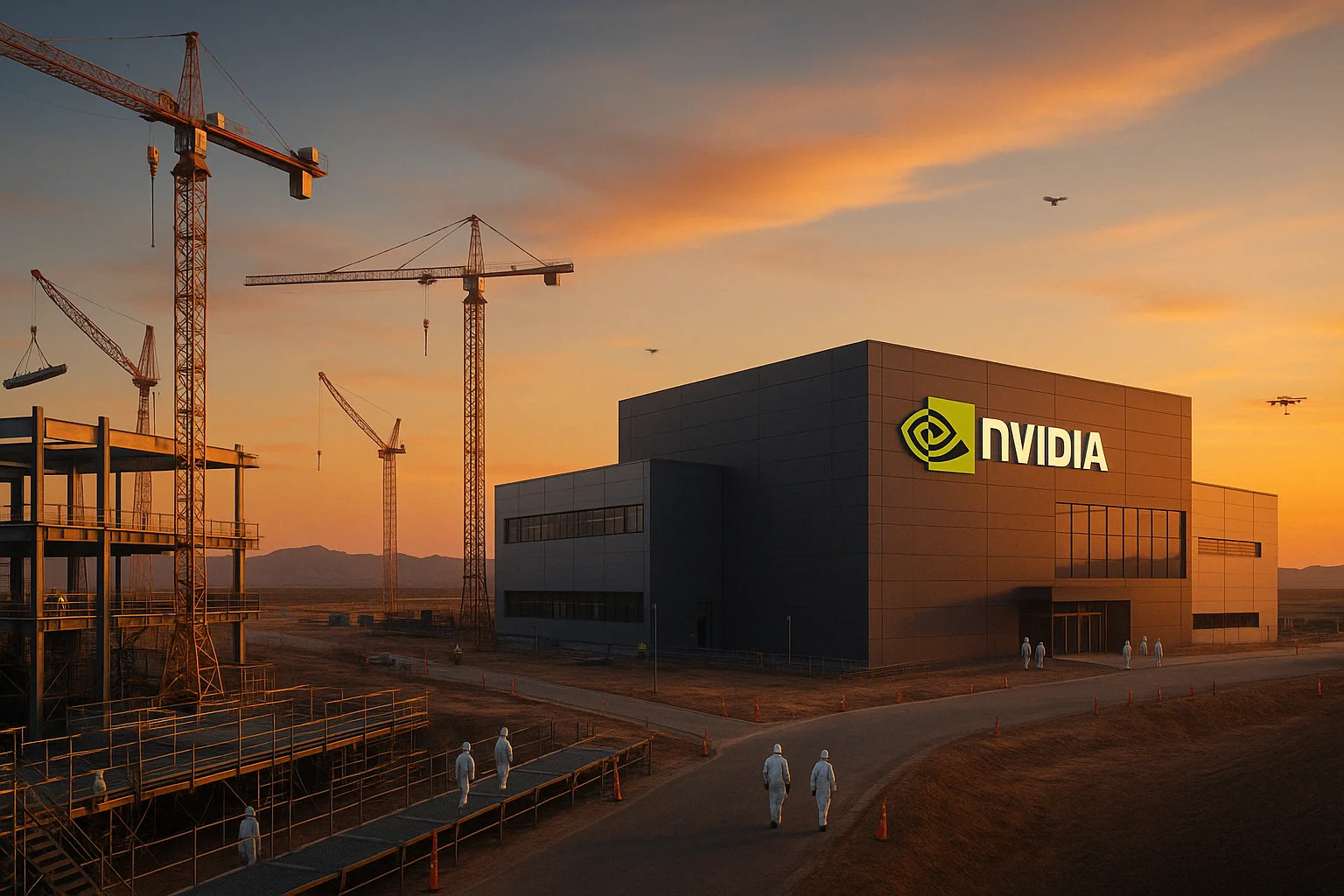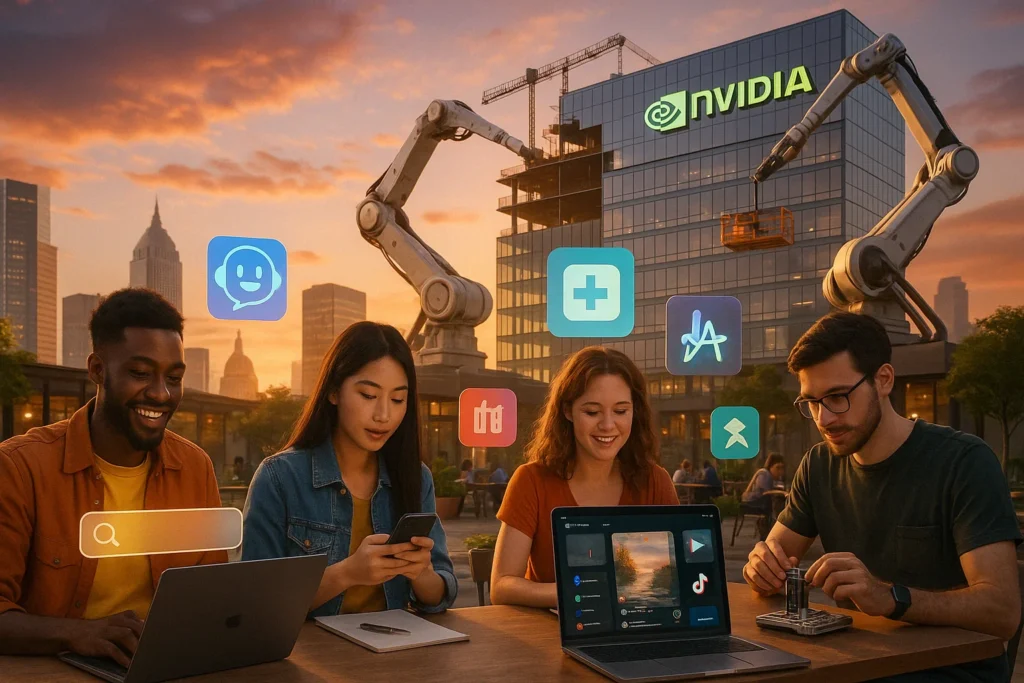
If Nvidia’s latest announcement doesn’t scream “tech flex,” I don’t know what does.
Nvidia AI infrastructure investment is the buzz of the business world right now—and for good reason. The GPU giant Nvidia just announced a jaw-dropping $500 billion plan to supercharge artificial intelligence infrastructure in the United States. That’s right: half a trillion dollars to build out AI dominance—and it’s all happening stateside.
Why This Matters (and Why Texas Is Now the Coolest Tech Hub)
Nvidia’s move to expand production facilities in Texas isn’t just a random real estate power play. It’s strategic, calculated, and quite frankly, a little patriotic. Amid rising trade tensions with China and global supply chain chaos, this U.S.-based investment is Nvidia’s way of saying: “We got this.”
The Nvidia AI infrastructure investment isn’t happening in a vacuum. It’s a full-blown collaboration with major industry powerhouses—TSMC, Foxconn, Wistron, Amkor, and SPIL. If those names sound familiar, it’s because they’re the backbone of semiconductor manufacturing.
Texas has been steadily transforming into a tech mecca for years, quietly attracting companies with its business-friendly regulations, generous tax incentives, and surprisingly reasonable cost of living (yes – I’m looking at you, California). By choosing Texas as the launchpad for this initiative, Nvidia is signaling that this state isn’t just a backup plan, it’s the main stage.
What They’re Building (Spoiler: It’s Big. Like, Really Big.)
This isn’t about slapping together a few data centers. Nvidia is investing in an ecosystem—production plants, chip development hubs, and AI-focused R&D centers. These facilities will churn out the high-powered processors needed to run everything from ChatGPT to driverless cars.
In other words, they’re building the hardware backbone of the future. AI as we know it depends heavily on chips that can handle massive amounts of data at lightning-fast speeds. Nvidia’s specialty. But the real kicker? They want the entire production process—design, manufacturing, testing, deployment—done here in the U.S.
Imagine what that means for innovation. It cuts down delays, improves quality control, and gives the U.S. unprecedented control over a crucial industry in a time where digital sovereignty matters more than ever.
This isn’t about slapping together a few data centers. Nvidia is investing in an ecosystem—production plants, chip development hubs, and AI-focused R&D centers. These facilities will churn out the high-powered processors needed to run everything from ChatGPT to driverless cars.
In other words, they’re building the hardware backbone of the future. AI as we know it depends heavily on chips that can handle massive amounts of data at lightning-fast speeds. Nvidia’s specialty. But the real kicker? They want the entire production process—design, manufacturing, testing, deployment—done here in the U.S.
Imagine what that means for innovation. It cuts down delays, improves quality control, and gives the U.S. unprecedented control over a crucial industry in a time where digital sovereignty matters more than ever.
Who Are the Key Players Involved?
Nvidia might be the headliner here, but it’s far from a solo act. The company is bringing in some of the biggest manufacturing names on the planet:
- TSMC (Taiwan Semiconductor Manufacturing Company): The silent king of the chip world. They make the processors in your iPhone and likely a dozen other devices you own.
- Foxconn: Best known for assembling Apple products, Foxconn’s inclusion speaks volumes about the scale and seriousness of this venture.
- Wistron, Amkor, SPIL: These companies specialize in precision electronics manufacturing and packaging—critical steps in making next-gen AI chips both powerful and efficient.
This collaborative approach is more than just smart—it’s resilient. By decentralizing critical components of the supply chain, Nvidia is shielding itself (and the U.S. tech ecosystem) from future disruptions.
The Bigger Picture: A Strategic Tech Play
Nvidia’s timing couldn’t be more perfect. With AI becoming the backbone of nearly every major industry—from healthcare to defense—owning the means of production matters more than ever.
This is also a clear response to tightening export controls. The U.S. has placed restrictions on shipping advanced chips to China. So what does Nvidia do? It doubles down on U.S. soil. That’s not just smart—it’s surgical.
And let’s not forget the jobs. Thousands of them. Engineers, technicians, software architects – this project isn’t just about chips. It’s about reshaping the future of American tech employment.
There’s also a strategic geopolitical layer to all this. For years, the U.S. has relied heavily on Asia—particularly Taiwan—for advanced chip manufacturing. But with rising tensions in the Taiwan Strait, this dependency is looking increasingly risky. Nvidia’s move could help the U.S. regain its technological autonomy.
Could This Trigger a U.S. AI Arms Race?
Absolutely. With other tech giants watching closely, don’t be surprised if we see similar mega-investments roll out in the coming months. Amazon, Apple, Microsoft—they’re not going to let Nvidia hog the infrastructure spotlight.
In fact, some analysts are already calling this the beginning of a new AI Infrastructure Arms Race—not just between corporations, but between nations. Europe, China, and the Middle East are all making serious moves in the AI space. If the U.S. wants to stay competitive, investments like this one aren’t optional. They’re essential.
This move also puts pressure on lawmakers to modernize regulations, boost STEM education, and ensure that this growing AI sector is ethical, inclusive, and innovative.

What This Means for You (and Your Smart Devices)
If you’re wondering how this affects your day-to-day life, here’s the scoop: faster AI assistants, better search results, more intelligent healthcare tools, and probably even better TikTok recommendations. It all trickles down.
But more importantly, it means the U.S. is making a serious play for tech independence—something we already explored in How AI Is Quietly Changing the Job Market, which dives into how automation is rewriting entire industries.
It also opens the door for a new wave of startups. When infrastructure improves, innovation follows. We’re about to see an explosion of companies building tools, apps, and systems on top of the capabilities Nvidia is creating.
The best part? It could mean more opportunity for creators, developers, entrepreneurs—and anyone willing to ride the AI wave.